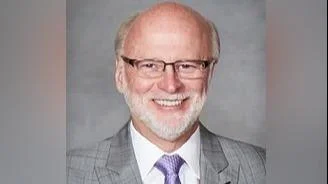Sen. Emil Jones III, D-Chicago | Facebook/ Emil Jones
Sen. Emil Jones III, D-Chicago | Facebook/ Emil Jones
State Sen. Emil Jones, III (D-Chicago) is one of several Illinois legislators who have personally benefitted from a private school education but have not shown support for extending the Invest In Kids Tax Credit Scholarship program.
The program serves nearly 9,400 needy children by providing tax benefits to donors who fund scholarships for children to attend private schools. Many students at Chicago Christian have been able to attend the school who would not otherwise due to the Invest In Kids Act. The school sends 90% of its students on to higher education.
“Your contribution through a tax credit scholarship provides a high quality, Christian-based education for students with financial need," Chicago Christian’s website reads. "This program benefits both Southwest Chicago Christian School and Chicago Christian High School students. In 2022/23, more than 100 students have been granted full or partial scholarships totaling over $900,000! We are currently seeking contributions to fund scholarships for the next school year.”
Jones is one of 35 of Illinois' 177 state legislators who attended private high schools. The private high school graduates include 10 Republicans and 25 Democrats, 15 of whom were raised in the City of Chicago.
The state's $50.5 billion 2024 budget, written on 3,500 pages, did not include funding needed for the continuation of the Invest In Kids Tax Credit Scholarship Program. The program, which allows donors to receive a tax benefit for donating to a state-maintained scholarship program for private schools for low-income families, serves over 9,000 K-12 students.
“This is not something that’s been covered by the budget agreement," Pritzker confirmed the exclusion of the program from the budget in a press conference, according to Prairie State Wire. "It’s something that still has time, potentially, but it’s not something that’s in the budget agreement.”
Critics highlighted the hypocrisy of lawmakers involved in shutting down the program. Pritzker and other politicians had sent or were sending their own children to expensive private schools while denying the same opportunity to less fortunate students.
The Wall Street Journal underscored the power dynamics between teachers' unions, Democratic lawmakers, and the failure of the public education system. The decision to end the scholarship program disregarded the needs of low-income students and prioritized the interests of unions over educational reform. The main reason behind the opposition to the program was the influence of teachers' unions, who wanted to eliminate it because its popularity highlighted the failures of public schools.
The Invest in Kids program received over 31,000 applications last year, indicating a high demand for alternatives to underperforming public schools. Many low-income families, particularly Black and Hispanic, supported the scholarship program because their assigned Illinois schools had low proficiency rates in reading and math. The failure of the public education system was evident from the fourth to eighth grades, leading to a high demand for alternatives. However, the unions prioritized their power over student learning and blamed the schools' failures on lack of funding rather than addressing systemic issues. WSJ reports union leaders hold significant influence over Illinois lawmakers, who have received substantial campaign contributions from teachers' unions.






 Alerts Sign-up
Alerts Sign-up